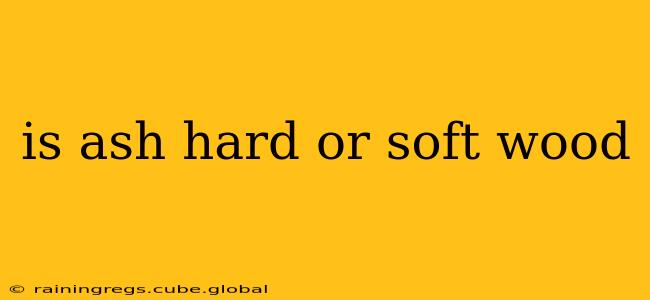Ash wood, prized for its strength and flexibility, often sparks the question: is it hard or soft? The answer isn't as simple as a yes or no. While generally categorized as a hardwood, understanding its properties within that classification offers a more complete picture.
What Defines Hardwoods and Softwoods?
Before diving into ash's characteristics, let's clarify the difference between hardwoods and softwoods. This isn't about the actual hardness of the wood; it's about the tree's reproductive method.
- Hardwoods: These come from deciduous trees (trees that lose their leaves seasonally). They tend to be denser, stronger, and more durable, though exceptions exist.
- Softwoods: These come from coniferous trees (cone-bearing trees like pines and firs). They are generally softer, lighter, and less durable than hardwoods, but again, there are exceptions.
Ash, being from a deciduous tree (genus Fraxinus), falls squarely into the hardwood category.
How Hard is Ash Wood, Really?
While classified as a hardwood, ash's hardness varies based on several factors including the species of ash (there are several), growing conditions, and the specific part of the tree. However, it's generally considered a relatively hard and strong hardwood. On the Janka hardness scale (a measure of wood's resistance to denting), ash typically scores between 1300 and 1800 lbf (pounds-force), placing it firmly in the "hard" range. For comparison, oak often scores higher, while pine scores significantly lower.
Is Ash Wood Suitable for All Applications?
Ash's hardness and strength make it ideal for various applications, but its properties also necessitate consideration of its limitations.
What is Ash Wood good for?
- Sporting Goods: Its shock absorption and strength make it perfect for baseball bats, hockey sticks, and tool handles.
- Furniture: Ash's durability and attractive grain make it a popular choice for furniture making, though it can be more challenging to work with than some softer woods.
- Flooring: Ash flooring is known for its durability and aesthetic appeal, but it requires proper maintenance.
- Musical Instruments: Certain parts of some musical instruments benefit from ash's resonance and strength.
Limitations of Ash Wood
- Working with Ash: Ash's density can make it more difficult to work with than some softer woods, requiring sharp tools and potentially more effort.
- Cost: Due to its desirable properties and relative scarcity (compared to some other hardwoods), ash can be more expensive than some alternative woods.
- Susceptibility to Damage: While durable, ash can still be susceptible to damage from moisture and insects if not properly treated and maintained.
What are the Different Types of Ash Wood?
Several ash species exist worldwide, each with slightly varying properties. The most common types influencing the hardness and other characteristics include:
- White Ash: A popular choice due to its strength and shock resistance.
- Green Ash: Often slightly less strong than white ash, but still a valuable hardwood.
- Black Ash: Known for its lighter color and somewhat less density than white or green ash.
Frequently Asked Questions (FAQs)
Is ash wood harder than oak?
While both are hardwoods, oak generally tests higher on the Janka hardness scale than ash. However, the difference isn't always dramatic and the specific species of both oak and ash play a significant role.
Is ash wood more expensive than pine?
Yes, ash wood is generally more expensive than pine due to its greater strength, durability, and desirability for many applications.
Is ash good for outdoor use?
Ash can be used outdoors, but proper treatment with weather-resistant finishes is crucial to protect it from moisture damage and insect infestation. Otherwise, its lifespan outdoors will be significantly reduced.
How can I tell if I have ash wood?
Identifying ash wood often requires an experienced eye. Look for its characteristic grain pattern, often described as straight and sometimes displaying a slight figure or flame effect. The color can vary from light tan to a reddish-brown. If you are unsure, consulting a professional woodworker or lumber specialist is advisable.
In conclusion, while ash is a hardwood, its precise hardness depends on various factors. Its strength, flexibility, and attractive grain make it a highly sought-after wood for numerous applications, despite its slightly more challenging workability and higher cost compared to some softer wood options.
